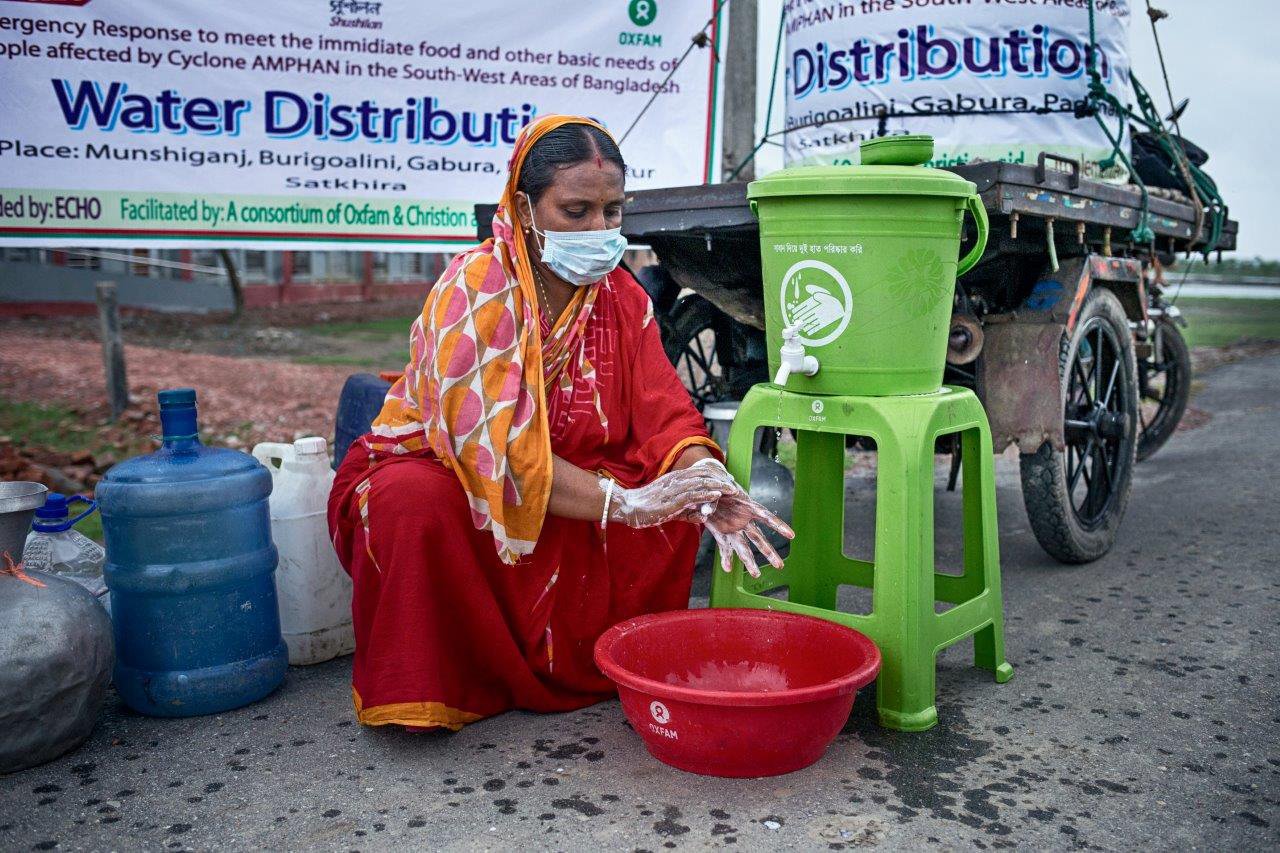An Oxfam partner responds quickly—and carefully—to help people in need.
When Cyclone Amphan—the most powerful cyclone ever recorded in the Bay of Bengal—churned into Bangladesh on May 13, it ripped apart houses and snapped power lines. Waves breached river embankments built to protect low-lying communities, and the floods that followed threatened the lives of everyone who didn’t make it to a shelter in time. Half a million people in Bangladesh may have lost their homes.
As changes in the climate warm the waters of the bay, storms here are intensifying. But this year, their impact will be magnified further and hugely complicated by the deadly coronavirus: the need for people to crowd into buildings that are safe from wind and floodwaters robs communities of a trusted tool in the fight against COVID-19—physical distancing.
Mostafa Nuruzzaman, the director of Oxfam partner Shushilan, knew that towns like Shyamnagar in the western district of Satkhira would be hammered by the cyclone. As Amphan swept across the water toward land, the Shushilan team there did its best to prepare. They cleaned and disinfected the local cyclone shelter, and readied their own training center to provide more space for people taking refuge from the storm. They ramped up their public health messaging about masks and distancing, and prepared hand sanitizer and a bar of soap for every family arriving at the shelters. Beyond that, they simply had to hope that this relatively remote town—spared the comings and goings of busier hubs, and somewhat protected by weeks of lockdown—would be lucky enough to avert an outbreak of COVID-19.
As soon as the cyclone passed by and the teams were safe to move, Shushilan and Oxfam staff donned personal protection equipment and set out to determine the needs in Shyamnagar and other struggling towns in the hard-hit districts of Satkhira, Khulna, and Bagerhat, distributing emergency rations of dry food and drinking water along the way. Now, they are engaged in a response—coordinated with the local authorities and tailored to the needs of each community—with special attention to the people whose situations are most dire.

Together, we raise our voices
Shushilan works in every district of the country, carrying out programs on everything from women’s economic empowerment to disaster risk reduction to health and nutrition. But when emergencies like cyclones strike, you will find them on the front lines of the response, sometimes plying the waters on tollers—the long, slender boats used by local fishermen—performing rescues. In the district of Cox’s Bazar, where close to a million Rohingya refugees from Myanmar live in crowded camps, Shushilan is working with both the Rohingya and the struggling communities that host the camps. For example, they are distributing dried beans, oil, and nutritional biscuits—as well as cash—to thousands of host community members who are struggling to feed their families during the coronavirus lockdown.
Shushilan has been working with Oxfam since 2010. A key Oxfam priority in Bangladesh has been to help domestic organizations like Shushilan become strong, independent humanitarian responders. Why? Because local and national organizations are often deeply rooted in—and trusted by—their communities, and well placed to save lives in emergencies. (Learn more about Oxfam’s local humanitarian leadership initiative.)
“Oxfam taught us about how to provide access to water and sanitation in emergencies, and how to promote safe hygiene, and now we’re in charge of all that for a Rohingya camp of more than 28,000 people,” says Nuruzzaman. “Oxfam also helped us improve our internal financial systems, which means now we are succeeding in getting funding for our programs from a variety of sources. Years ago we had only a few agencies supporting our work; now we have more than 110.”
What Shushilan brings to the table is immeasurable—their local knowledge, their network of more than 10,000 volunteers, the relationships they’ve built in the communities through years of working for positive change, their unwavering commitment—and their perspective.
“The people here are brave and can face any kind of emergency,” says Nuruzzaman. But at times like these he is frustrated by the unfairness of it all. “Inequality can turn a natural hazard like a cyclone or a virus into a catastrophe for everyone but the rich. And the disasters themselves deepen the divide between rich and poor.”
Still, he says, “I believe in the future of Bangladesh.”
“We like working with Oxfam,” says Nuruzzaman. “Together, we raise our voices against the forces destroying the world.”
In response to the coronavirus crisis, Oxfam and 23 Bangladeshi partner organizations have stepped up our work on helping the poorest communities gain access to clean water and sanitation facilities, and the materials and information they need to protect their health through safe hygiene. The crowded camps for Rohingya refugees are particularly vulnerable to the spread of COVID-19; Oxfam and partners are providing water, sanitation, and hygiene support to 173,000 camp residents and 9,000 people in the surrounding communities. With enough funding, we aim to deliver cash to 100,000 families in and around the camps, enabling many of the most vulnerable families to buy food and other essentials from local businesses that are also struggling in this crisis.
